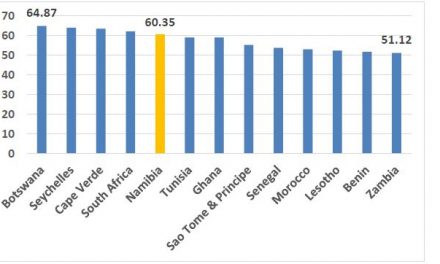
Government urged to introduce value addition policies
Vice-chairperson of the Namibia Manufacturers Association, Dr Diana L van Schalkwyk said, the future of manufacturing is somehow uncertain, especially considering the downward trend in value-added output.
She said this at the Bank of Namibia’s 17th Annual Symposium which was held late last month, that focused on reducing unemployment in Namibia: Creating More Jobs in the Manufacturing and Tourism Sectors.
“The World Bank’s website, depicting value-added products as a % of GDP, a definite decline is observed since 2011 decreasing from 14.77 % to 9.19% in 2015. Although in line with the worldwide trend due to the financial crises, it is definitely not beneficial for Namibia,” she said.
“The ongoing drought has a devastating negative impact on the Namibian economy. This is currently evident in the manufacturing industry where specific activities have to be seized or minimized due to water shortages, while factories rely on a sufficient supply of potable water for operations and cleaning,” she added.
Van Schalkwyk detailed that according to the 2015 Namibia National Accounts, the manufacturing sector contributes approximately 8.5% to the country’s Gross Domestic Product and accounts for 4.8% of the local labour force. “It is estimated that around 30 000 people are employed in the Namibian manufacturing sector. Namibia has an elaborate Industrial Policy with “Growth at Home” as supporting strategy, but no Value-addition Policy,” she said.
She said that this is even more reason to introduce a strong Value addition policy in Namibia. “In the absence of such a policy, certain actors in the value chain are often unnecessarily penalized and result in some value chains being unproductive. The agriculture sector in Namibia is by far the largest employer (29%) with mining being the largest contributor to exports (47.6%) and the GDP (12.5%)” van Schalkwyk noted.
The chairperson of the Manufacturers Association of Namibia explained that Namibia faces a conundrum as it produces what it doesn’t consume and consumes what it doesn’t produce, adding, “Global trade is based on goods, not services. This is a very basic rule; if a country does not produce goods, it will continue to be poor.”
The paper presented at the symposium further focused on comparative studies for industrialization to work in Africa taking the lessons from East Asia and China, stressing that public policymakers must overcome the old mindset of orthodoxy and inward looking.
Van Schalkwyk highlighted two priorities in the Harambee Prosperity Plan pertaining to manufacturing as 1: to create a minimum of 8000 jobs in the manufacturing sector during the Harambee period and 2) to increase volumes of locally produced goods supplied to the public and retail sectors in Namibia. She however warned that care must be taken with the management of the HPP as a forced increase in employment can follow the trend of the so-called “Phillips Curve”. “As an economy grows faster and more people are employed, wages start to increase slowly thereby increasing cost of production, which is passed on to the price of goods. This may give rise to increased inflation. Employment can then experience a downward curve again,” van Schalkwyk explained.
She listed the hindrances currently facing the manufacturing industry as a lack of finance, skills shortages, and a lack of scientific training in Namibia as many graduates from tertiary institutions in Namibia do find employment in the manufacturing sector. “It is as if there is a lack of co-ordination between these institutions and the private sector, which must definitely be addressed.” said van Schalkwyk.
She further made reference to the President and CEO of the firm, Sealed Air, predicting that by 2050 Africa will replace China as the world’s leading manufacturing continent. “The manufacturing industry is a value-added sector that has the ability to create additional employment.” she stressed.













































